Installation and operation, Installation – Niveo Professional NUPS20-3 User Manual
Page 9

Front Panel:
1000VA-2000VA 2000VA-3000VA
1
2
-
-
3
4
5
6
7
8 9
Rear Panel:
1000VA-2000VA 2000VA-3000VA
3 2 1
REMOTE
7
4
IN
OUT
INTERNET
5
AC INPUT
OUTPUT
1
2
3
6
- 6 -
INSTALLATION AND OPERATION
Upon receipt of the UPS, inspect the shipping carton for damage. If there is
any obvious damage, immediately report it to the selling dealer or the
delivering carrier. If there is no damage to the shipping carton, unpack the
unit and inspect the unit for damage.
The UPS is designed for installation in a protected environment within a
temperature range from 32°F to 104°F and relative humidity of 0
90%
without condensation. Do not block inlets and outlets. Install the system in a
location free from excessive dust and chemical fumes.
Check the identification label to verify the UPS voltage and power rating
match the available line voltage and load requirements.
Installation:
1. Check if the main switch on the UPS front panel is in the off position and
insure that the voltage of the AC utility source corresponds to the
nameplate on the UPS rear panel.
2. Plug the power cable into the grounded socket.
3. Push the main switch, then the Load Level LCD(
) will light on after 2
seconds and CUT-OFF LCD(
) will light off. The UPS will then get
ready and start to work normally.
4. Connect your PC with UPS, then turn on PC. Be sure to check the
Load Level LCD(
) indicator and DO NOT
OVERLOAD it over 100%. To simulate AC failure (Push UPS test
switch) can help to insure whether UPS is in good condition or not. It is
designed to alarm every 3 seconds and with BACK-UP LCD(
-
) light
on when simulation starts. If the CUT-OFF LCD(
) is on, it means
UPS fault or BATTERY fault. Then you have to contact your local
service center
5. When battery approaches low level(
-
),
alarm will beep every second until auto shut down
6. The 4 conditions UPS will automatically shut down:
a. Battery low
b. Short circuit
c. Overload
d. UPS fault
- 7 -
